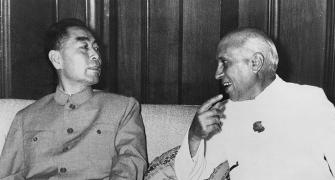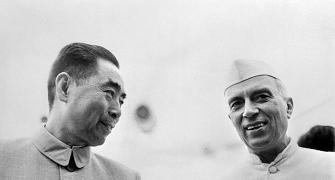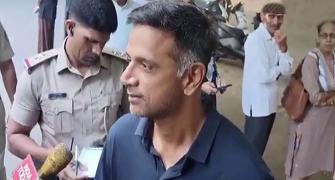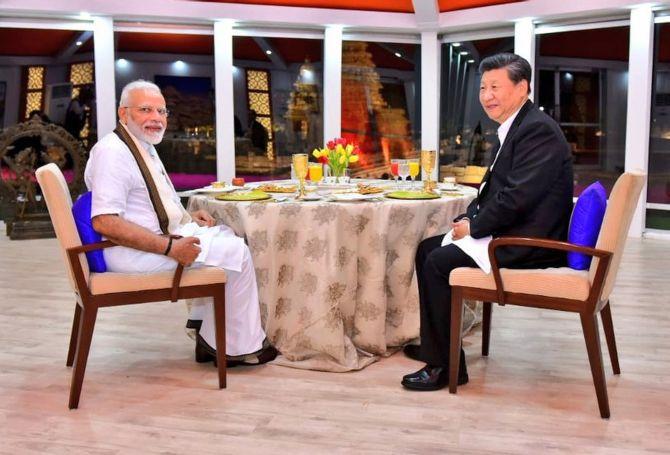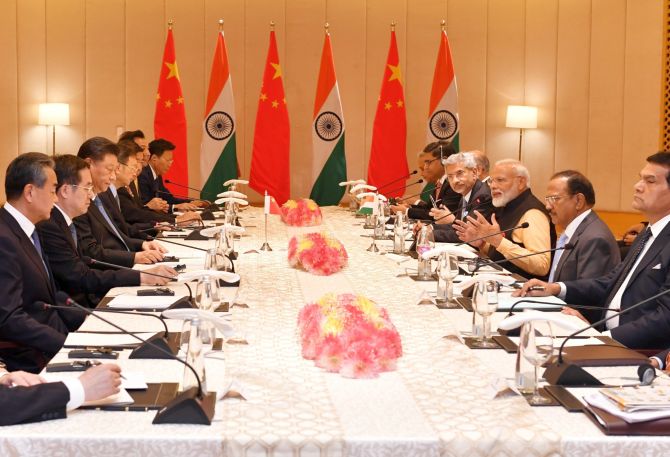'India's relationship with China has been and will continue to be complex, delicate and sensitive,' says Rup Narayan Das.
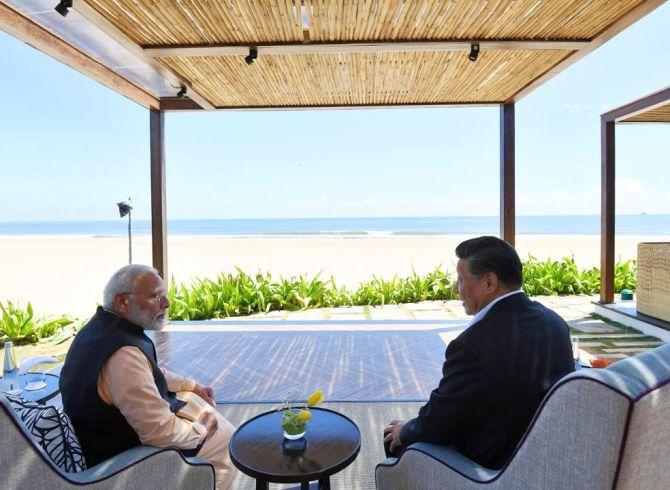
Although the second India-China informal summit in Chennai did not arouse unrealistic expectations, developments such as India's abrogation of Article 370, China's reference to it at the UN general assembly and Chinese observations during Pakistan Prime Minister Imran Khan's visit to Beijing ahead of President Xi Jinping's journey to Chennai did cast a shadow. But the fructification of Xi's visit as scheduled set at rest the uncertainty and negative speculation.
Did the summit usher a new era? There were no agreements or MoUs signed although there were delegation-level meetings besides the extended 'heart to heart' discussions between Prime Minister Narendra D Modi and Xi who have so far met more than 12 times.
The importance of the meeting can only be understood and appreciated if we recognise that we can choose our friends, but we cannot choose our neighbours. Engagement with China, India's largest and powerful neighbour, is not an option, but a political and strategic imperative, more so when there is asymmetry between the two countries.
India's relationship with China has been and will continue to be complex, delicate and sensitive.
The relationship between the two countries not only has the potential to impact regional and global geo-politics and geo-economics, but also to be impacted by geo-strategic developments outside the perimeters of the bilateral relationship between the two countries.
Rising nationalism in India and China adds to the complex dynamics of the relationship between the two countries.
It is against this backdrop that the outcome of the Chennai summit should be assessed. True, Modi and Xi have been meeting on the margins of multilateral fora like G-20, BRICS, SCO, ASEAN and the East Asia Forum besides structured State visits, but such meetings have their inherent limitations partly due to the paucity of quality time and the structured nature of the dialogues, mental fatigue etc. Further, the expectation of deliverables at times results in half-baked MoUs.
India and China are yet to have annual summit level meeting as India does with both Russia and Japan. But the fact that there is no structured dialogue at such informal meetings creates an atmosphere of informality so that the two leaders can discuss issues of mutual interest without inhibition and prohibition on one-a-one basis.
What they discussed in Chennai is privileged communication in the best interest of both countries. Only at the macro level are the broad themes made available to the media. In China's context, Mao's dictum that 'Power flows from the barrel of the gun, but it is the party that commands the gun' should be kept in mind. This suggests that there is unity of command in a political system like China.
President Xi is not only head of the Chinese State, he is also chairman of the Chinese Military Commission and general secretary of the Communist party. The Chinese constitution has been recently amended making him president for life. Thus, it is all the more essential for the two leaders to have strong bonding and a comfort level.
The statement issued by the ministry of external affairs and the articulation by Foreign Secretary Vijay Gokhale needs to be read carefully. The fact that Kashmir was not discussed is itself vindication of India's position as explained to China in no uncertain words.
The discussion on terrorism underscored the urgent need to contain cross-border terrorism aided and abetted by State actors. The message was loud and clear to Pakistan. The fact that Xi didn't raise the issue with Modi suggests that Pakistan's perspective on the issue did not deserve precious time on the top leaders's agenda.
At a time when there is some anxiety in China with regard to India's growing strategic security proximity with the United States, the assertion by the leaders that 'it is important to support and strengthen the rule-based multilateral trading system at a time when globally agreed trade practices are being selectively questioned', suggested that there is strategic autonomy in India's foreign policy. This is critical to develop strategic trust between the two countries.
The Chennai summit, which followed on the heels of Modi's US visit and the orchestrated meeting with President Trump in Houston, presumably dispelled anxiety -- if any -- about the New Delhi-Washington bonding among the Chinese leadership.
The decision to establish a high level economic and trade dialogue mechanism with the objective of achieving enhanced trade and commercial relations is very significant. India has been demanding that the Chinese address the growing trade imbalance.
Of late, China has started paying attention to address the trade deficit with India and taken some measures so that India's pharmaceutical companies can access the Chinese market. While this augurs well, New Delhi has to grapple with Beijing's expectation that the Chinese behemoth Huawei be permitted to access India's 5G market. India will need to take a calibrated response on this issue which is fraught with security implications.
Like the bullet train, which India opted for Japanese and not Chinese technology, India has to take a bold and courageous decision keeping in mind the nation's larger interest.
Although many of Modi and Xi's pronouncements leaders were in the nature of reiteration of earlier stands, those positions were neverthless reinforced to strengthen strategic trust and communication between the two leaders and the diplomatic and bureaucratic apparatus.
If one looks back at the recent history between the two countries, the gradual and incremental progression of strategic trust between India and China after then prime minister Rajiv Gandhi's ice-breaker visit to Beijing in 1988 is very much discernable.
It is not that China is not a hard nut to crack. Let it not be forgotten that until 2003, China did not recognise India's sovereignty over Sikkim. It was during then prime minister Atal Bihari Vajpayee's visit to Beijing that year that China recognised India's sovereignty over Sikkim.
Similarly, China used to issue stapled visas for Indians from Jammu and Kashmir, a practice which they stopped in recent years.
The Chennai summit may not be a milestone or a path breaking event, but it certainly a significant meeting to forge strategic trust between the two countries.
Dr Rup Narayan Das is a Delhi-based China scholar, currently a senior fellow at the Indian Council of Social Science Research, affiliated to the Indian Institute of Public Administration, New Delhi.

